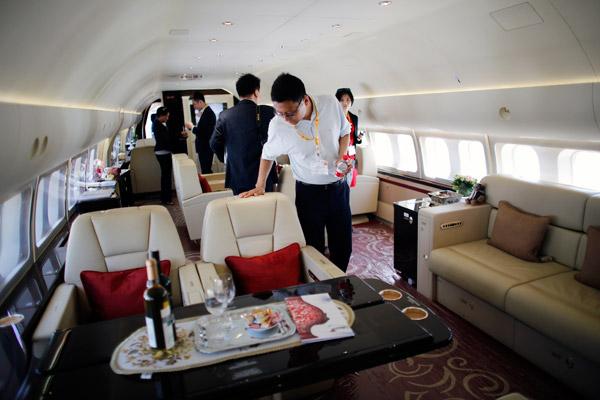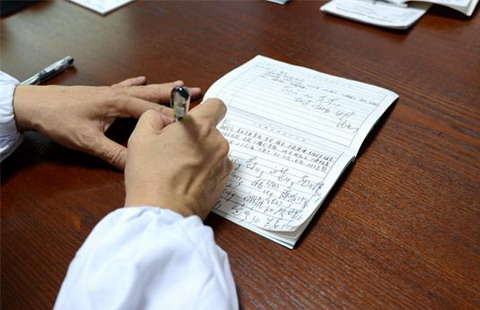Shanghai show focus on business aviation
Updated: 2015-04-13 04:48
By PAUL WELIZKIN in New York(China Daily USA)
|
||||||||
 |
|
Guests look at the inside of a Boeing Business Jet BBJ 777 during the Asian Business Aviation Conference and Exhibition at Hongqiao International Airport in Shanghai in 2014. [Photo/Agencies] |
Aviation industry watchers believe that China's business-aviation market seems to have stabilized after experiencing a slowdown amid the country's changing economic priorities and, in part, because of the anti-corruption campaign.
"The market was really hot a couple of years ago and then cooled off," Brian Foley, an industry consultant with Brian Foley Associates in Sparta, New Jersey, told China Daily on the eve of the Asian Business Aviation Conference and Exhibition (ABACE) that opens on Tuesday at Shanghai's Hongqiao International Airport. "I believe it has troughed and now I think most people have confidence that the market is poised to take off again."
Organizers of the three-day show expect about 170 exhibitors and some 40 aircraft to participate. The show caters primarily to China's business and general-aviation market, which typically refers to relatively small, privately-owned and often business-related aircraft, in contrast to commercial airliners or military planes. ABACE is considered the region's premier event focusing exclusively on the continued development of business aviation.
"This year's ABACE will bring China to the center of the world's business aviation community, just as the event has in years past," Ed Bolen, president and CEO of the National Business Aviation Association, said in a statement. The NBAA serves as a co-host for the event.
Some of the world's major aircraft manufacturers such as Airbus, Boeing, Dassault Falcon, Embraer and Gulfstream have confirmed their participation in the show, according to the association.
Foley said the moderating Chinese economy – due in part to the shift toward consumption from manufacturing – has slowed growth rates for business aviation in China.
"The stock market in China has been on a roll recently and I believe there will be some carryover from that," he said. "I think demand will continue to rise for business aviation in China because the country is located so far away from some of the major business centers in the world and it takes a long time to travel to those areas."
Personal-aircraft sales and the general-aviation market in China are poised to grow as the country eases restrictions that have hampered the industry. Foley said the loosening has been on a slow pace.
"I think Chinese officials now have a handle on what some of the impediments are for business aviation and are taking steps to improve the situation," said Foley.
Observers believe that new rules on flight permit procedures and low-altitude airspace management – 1,000 meters or below – will open a new chapter for general aviation in the country. In 2013 China initiated new flight approval procedures. Under the new regulations, general aviation flights no longer need advance applications and approvals from authorities except in special circumstances such as flying through restricted zones and conducting aerial photography of military facilities. This has helped to spur general aviation sales.
Andrew Ponzoni, senior communications manager for Dassault Falcon, told China Daily last year that Dassault is proof of the potential for the general aviation market in China. "In 2006 we sold our first plane in China. By 2011, China represented our largest worldwide market for new aircraft sales," he said.
paulwelitzkin@chinadailyusa.com

 National festival underway with cherry blossoms
National festival underway with cherry blossoms
 Hillary Clinton's China connections
Hillary Clinton's China connections
 Bicycle-friendly Hainan hotels cater to riders
Bicycle-friendly Hainan hotels cater to riders Stars dazzle at 2015 MTV Movie Awards
Stars dazzle at 2015 MTV Movie Awards
 Top 10 best airlines in the world
Top 10 best airlines in the world
 Can doctors' illegible handwriting be justified?
Can doctors' illegible handwriting be justified?
 Take home as many as you like
Take home as many as you like
 Weifang holds kite fair
Weifang holds kite fair
Most Viewed
Editor's Picks

|

|

|

|

|

|
Today's Top News
Hilary Clinton launches presidential campaign
'No room' for election China-bashing: US politicians
AVIC buys Calif. aviation parts distributor
Protests across Brazil seek ouster of president
US backs China's campaign to hunt down fugitives
Obama, Castro hold historic meeting, vow to turn the page
Living Buddha talks Tibet
Consulate general praises C-100 on 25th anniversary
US Weekly

|

|







